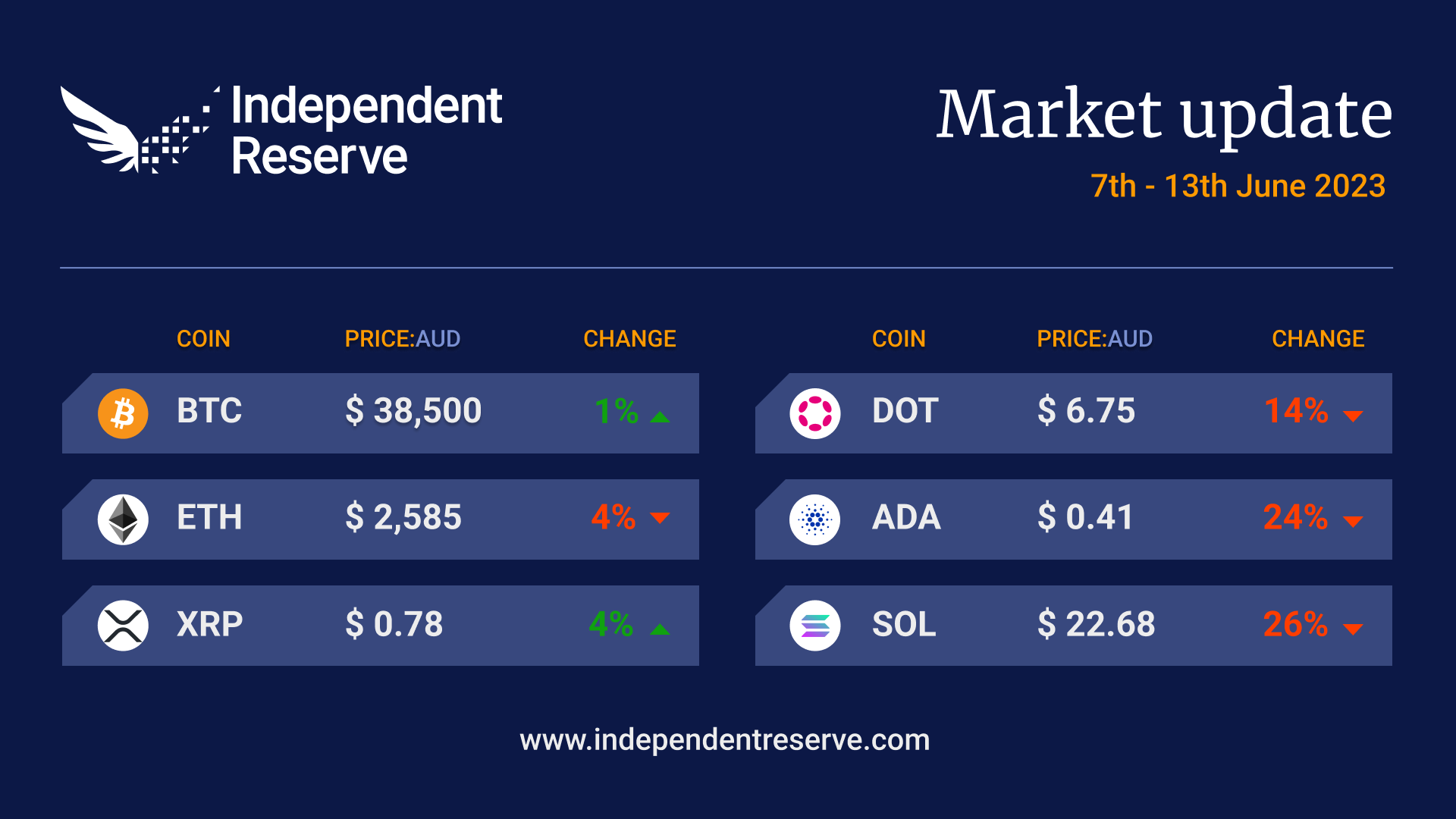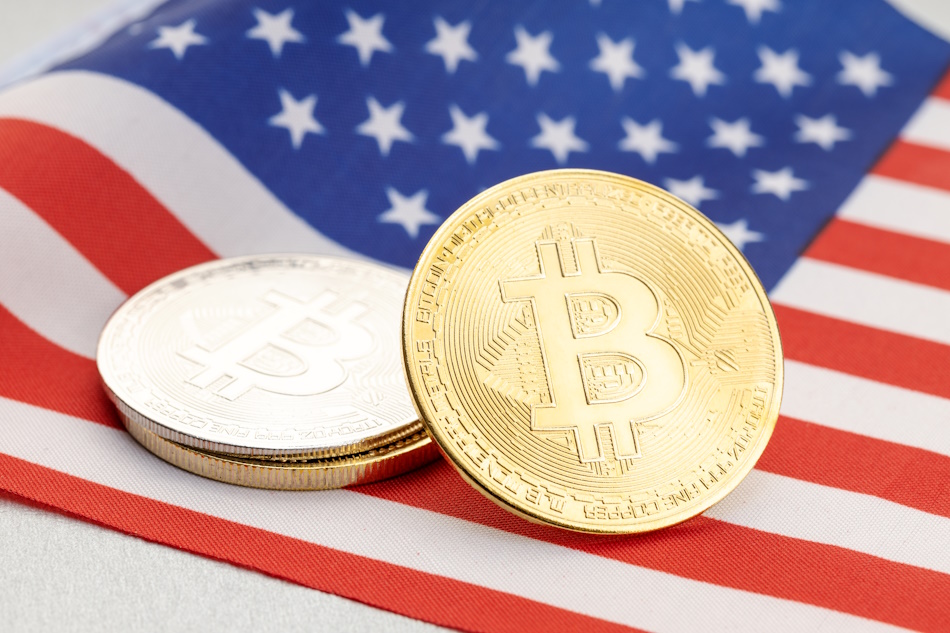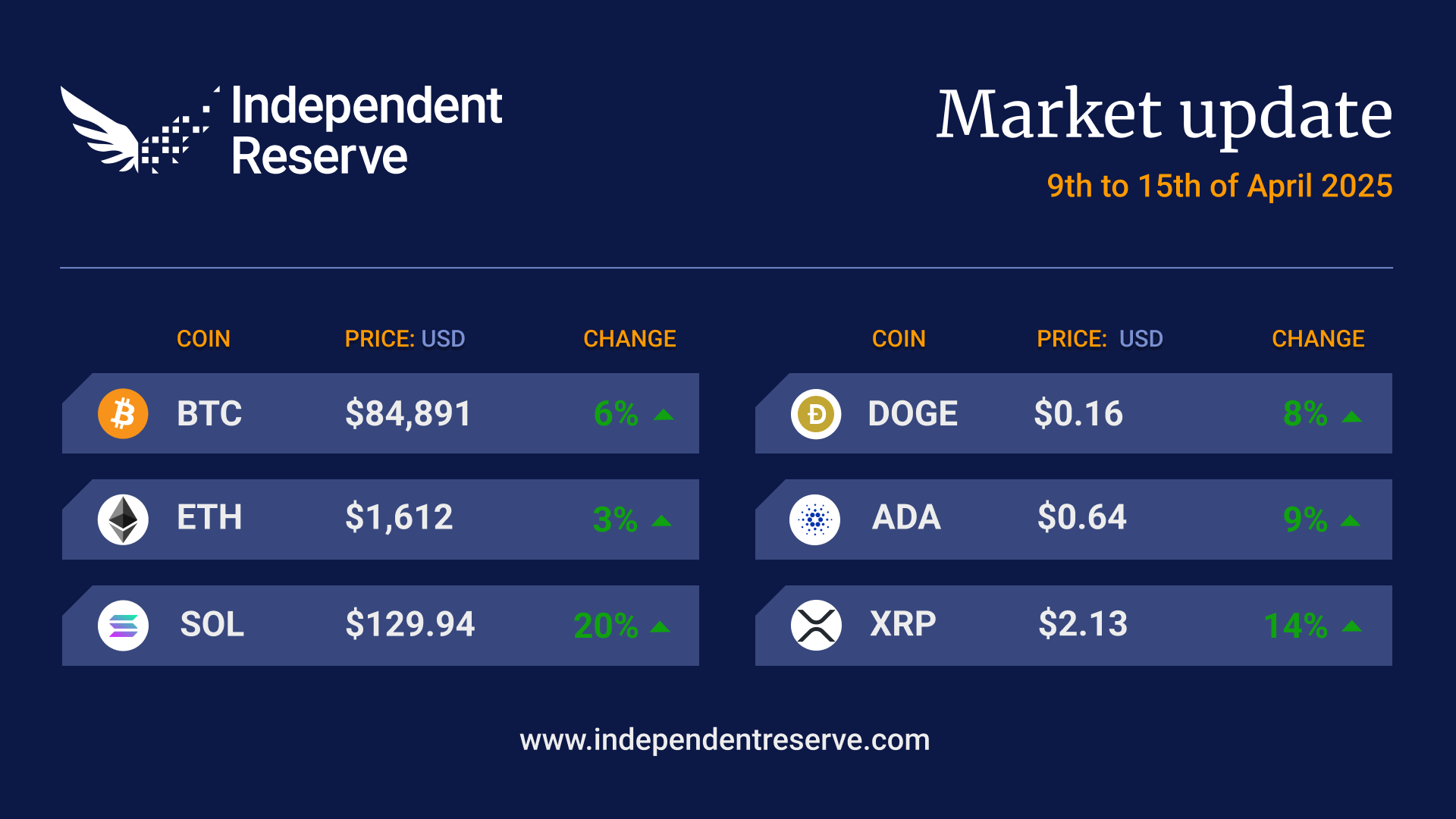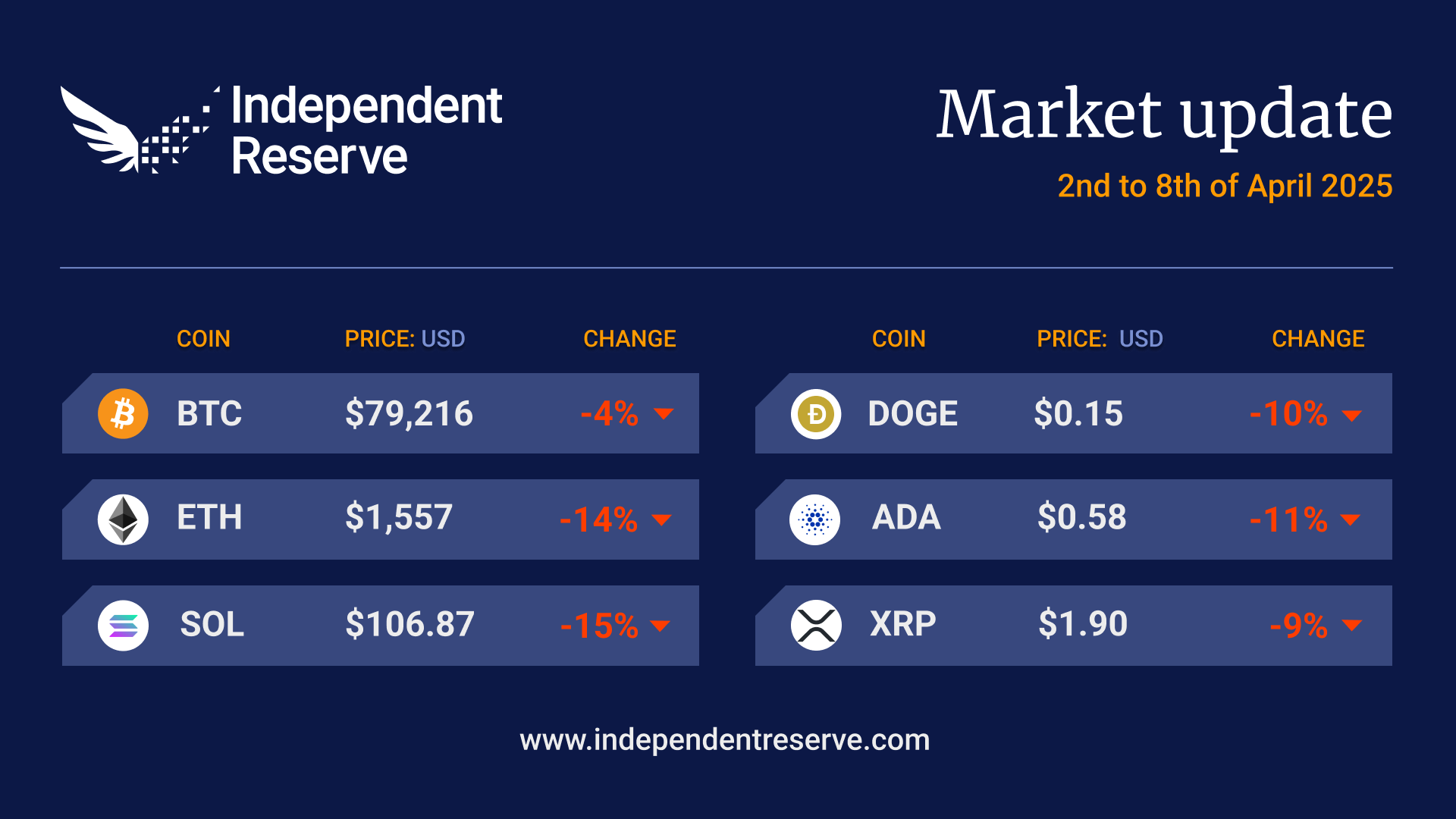Independent Reserve is 10: A message from our Group CEO
As Independent Reserve marks a significant milestone of 10 years in the cryptocurrency industry this week, our group CEO, Adrian Przelozny, reflects on the journey so far and shares insights into our values, achievements, and future aspirations.
Thank you for being an integral part of our journey, and we look forward to the next 10 and beyond.
Read Adrian’s full message here.
In markets
The great crypto crackdown in the US weighed heavily on markets this week with the overall market cap falling to A$1.56 trillion (US$1.05T). Bitcoin and Ethereum held up better than most, with BTC flat on the same time last week (which was the immediate aftermath of the charges against Binance) at $38,350 (US$25,930), while Ethereum fell 3.6% to $2,578 (US$1,742). XRP gained 3.75%, but pretty much everything else was down, led by tokens the Securities and Exchange Commission has named as securities in court filings: Cardano (-21.5%), Solana (-24%) and Polygon (-22.7%). Dogecoin fell 7.4%. The Crypto Fear and Greed Index (which mainly measures sentiment around Bitcoin) remains at 47 or Neutral.

From the OTC desk
The correlation between global equities (particularly US tech stocks) and cryptocurrencies remains broken. Pending SEC action being the primary cause for the divergence. The good news, however, is that the NASDAQ Composite continues to power ahead – and is now up nearly 30% year to date! This rally has defied tighter monetary and fiscal policy, as investors weigh the peak of the monetary policy cycle against growth. Right here and now, growth is winning, and this is a positive take away for the high beta cryptocurrency complex – all things considered.
In the US, the Federal Open Market Committee (FOMC) is scheduled to convene on Thursday the 15th of June at 4:00am AEST. There remains some policy conjecture as to whether the FOMC are now at the federal funds rate maxima for the cycle. Thursday’s meeting may help clarify the FOMC’s current forward guidance. Short-term interest rate futures have an 80% chance that the federal funds rate will remain unchanged at the meeting, with a 20% chance of a 25bp increase.
Additional (critical) US economic data includes US core inflation (May). Scheduled for release on Tuesday the 13th of June at 10:30pm AEST, US core inflation is forecast to soften from 5.5% in April to 5.3% in May. Interestingly, headline inflation is forecast to move from 4.9% in April to 4.1% in May. Watch for any detail on ‘super-core’ inflation – which is services inflation less food, energy, and housing. This has become a preferred measure for the FOMC.
In Australia, employment data headlines the economic calendar. With the Reserve Bank of Australia (RBA) surprising the market at both the May and June meetings with successive increases in the cash rate, the employment side of the RBA mandate will become increasingly important. This Thursday at 11:30am, the Australian unemployment rate is expected to remain at 3.7% (which is near an historic 50-year low). The domestic market awaits a clear economic signal that labour market slack is returning; and that all the work of the RBA is meaningfully slowing services inflation.
On the OTC desk, there has been significantly more activity in alts this week. And while intuitively this makes sense (given the volatility and price action), it remains somewhat unexpected. What this has proven, is that patient, dip buyers, remain. Activity in the majors has tended to be more mixed, with both BTC and ETH seeing good two-way price action. Both BTC and ETH have proven significantly less volatile than smaller market cap tokens – reassuring to the segment. For the time being, USDT buying/selling doesn’t appear to make economic sense, with AUD trading at 0.6750 and USDT trading sub 1:1 USD. Stable coin to fiat trading has remained opportunistic and price dependent. Activity levels in stables can turn very quickly.
For any further information, please feel free to reach out.
SEC’s war on Coinbase
The SEC’s war on crypto kicked into overdrive this week, with the regulator suing the publicly listed Coinbase for trading in unregistered securities. The case is notably different to the accusations against Binance however, which included volume inflation, comingling of funds and trading against customers. The SEC alleges Coinbase is operating an unlicensed securities exchange, brokerage and clearing agency and claimed tokens Solana, Cardano and Polygon are securities, as well as Coinbase’s staking program. The court case will likely take years. Binance, Binance US and Coinbase saw US$4 billion (A$5.92B) in outflows in four days after the news broke.

Why is the SEC doing this?
Crypto industry insiders believe that the crackdown is due to SEC boss Gary Gensler overcompensating for his failure to prevent the FTX collapse last year. “[Gary Gensler] opened up this year, in 2023, with all these enforcement actions; I think it looks like CYA [cover your ass] to me,” argued US Congressman French Hill. Gensler now believes almost all cryptocurrencies are securities, and the SEC has named 67 tokens specifically as securities, accounting for about 10% of the wider crypto market cap. If the courts agree then almost all crypto exchanges in the US have been operating illegally – Robinhood ditched trading in Solana, Polygon and Cardano as a result. But has Gensler overstepped his authority? Coin Desk argues that the existence of the McHenry-Thompson draft bill on crypto legislation and the Lummis-Gillibrand draft crypto bill, means that Gensler is “trying an end-run around Congress” which may violate the Administrative Procedures Act. The 1946 law makes administrative bureaucracies subordinate to democratic lawmaking processes.
Today and tomorrow are a turning point
In the early hours of Tuesday morning crypto law account Metalawman stated “the next 36 hours will be critical for crypto.” The lawyer pointed to Binance.US filing its opposition to the SEC’s motion to freeze its assets, and the hearing itself. But perhaps more importantly the “Hinman” documents in the SEC case against Ripple are set to be released. The internal SEC documents relate to former official William Hinman’s 2018 speech in which he declared Ether was not a security, which may (or may not) also suggest Ripple and other tokens are not securities. Ripple boss Brad Garlinghouse teased earlier today the docs “were well worth the wait.”
Other SEC fallout and manoeuvers
United States Rep. Warren Davidson has introduced the “SEC Stabilization Act” into Congress to fire Gary Gensler. But even if the stunt somehow got enough support to pass, legal experts cite a 2010 precedent suggesting SEC officials can’t be removed for anything short of “neglect of duty or malfeasance.” But perhaps the Biden administration will pay a price at the ballot box? Gemini co-founder Cameron Winklevoss pointed out that, “Crypto has already won the hearts and minds of Millennials and GenZ”, while his brother Tyler stated: “[Roe v. Wade] cost Republicans the mid-terms. The Senator Warren and Gary Gensler war on crypto will cost Dems the 2024 election.”
US crypto firms look overseas
The pullback of crypto firms from the US market looks set to continue. Crypto.com has announced it will no longer offer US institutional clients services from June 21. Major crypto investment firm a16z is opening its first international office in the UK and pointedly made reference to the UK being “on the right path to becoming a leader in crypto regulation.” PM Rishi Sunak warmly welcomed a16z, stating the country must “embrace new innovations like Web3”. And Hong Kong legislator Johnny Ng has made a pitch for Web3 companies to relocate to the Chinese territory. “I hereby offer an invitation to welcome all global virtual asset trading operators including @coinbase to come to HK for application of official trading platforms and further development plans.” More than half the Bitcoin and Ethereum held on reserves has now been moved outside of the US, with a CryptoQuant report showing that BTC reserves on US based exchanges are down to 2017 levels.
CBA blocks crypto transfers
Commonwealth Bank has followed Westpac’s lead in preventing customers from spending their own money. It said that in order to prevent scams, it is limiting customers from sending money to certain crypto exchanges, there will also be 24 hour holds placed on various payments to crypto firms and a $10,000 monthly limit imposed on crypto purchases in the coming months. It marks a big turnaround for the bank, which had planned to offer crypto trading itself in 2021, but paused the rollout in May 2022 following the Terra collapse.
Bull turns bearish
One of Bitcoin’s most bullish analysts has turned bearish, with Bloomberg Intelligence’s senior macro strategist Mike McGlone telling his 58,000 Twitter followers that things were looking grim for Bitcoin. “The crypto has bounced from too cold in 2022 at around US$15,000 (A$22.2K) and may have turned too hot in April at about US$30,000 (A$44.4K). It’s the enduring patterns of booms on the back of liquidity and busts when it’s removed that tilts our direction bias for Bitcoin toward respecting the down-sloping 52-week mean.” McGlone previously said the second half of 2023 could get ugly if the Fed keeps hiking interest rates.

Crypto continues
Into the Block released a report showing that the market share of DEXs surpassed 20% for the first time in May. DeFi trading volumes also surged 450% this week, following the Binance and Coinbase news. However, Total Value Locked in DeFi fell to US$42.95 billion (A63.6B) and most DeFi tokens fell into deep red territory. Meanwhile VC investment in crypto projects surged by 34.11% in May over the previous months, with US$1.11 billion (A$41.64B) invested across 81 deals. The US$115 million (A$170M) funding round for OpenAI boss Sam Altman’s eyeball scanning Worldcoin project was the largest single raise.
Until next week, Happy Trading!


